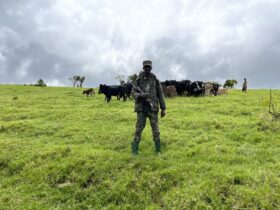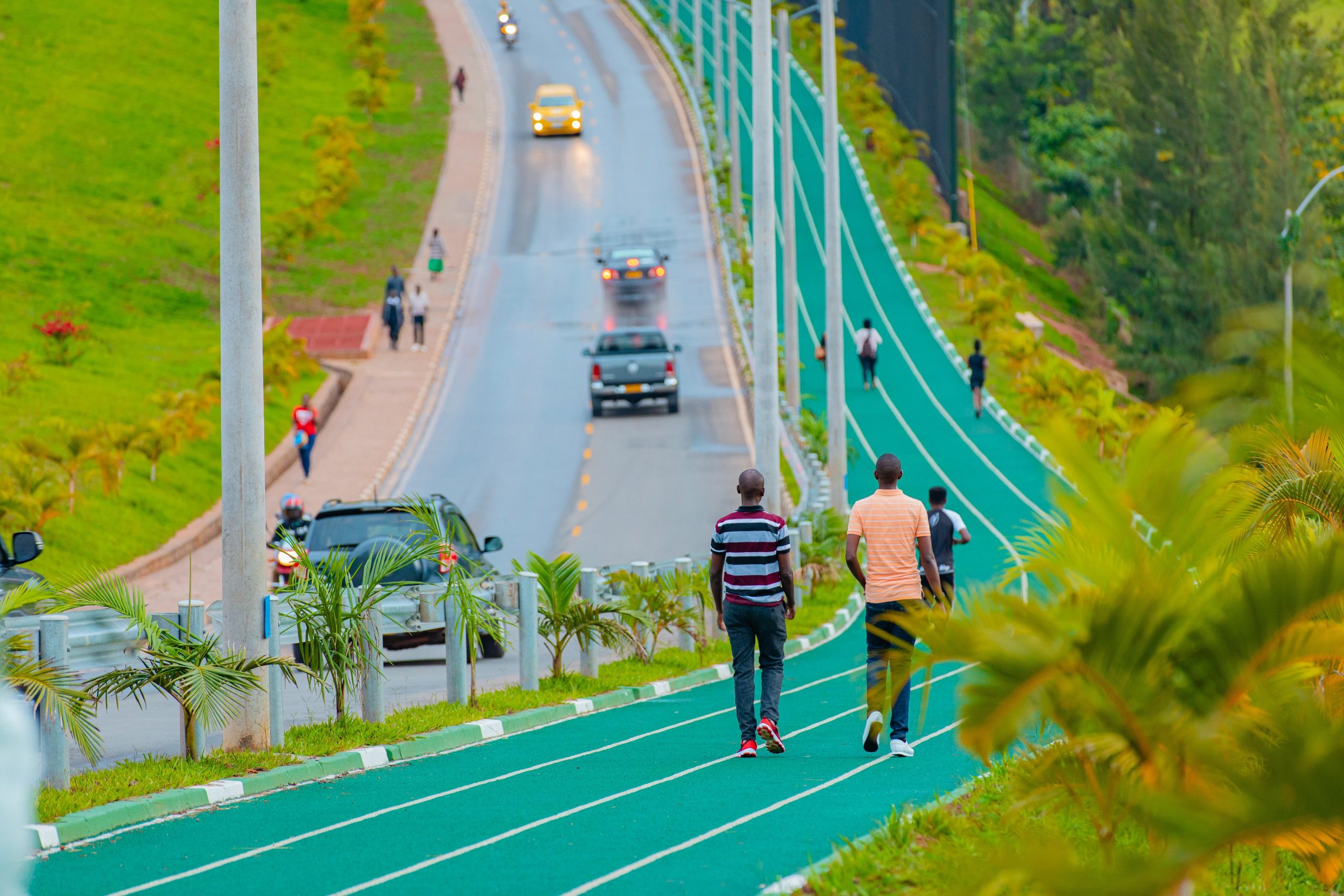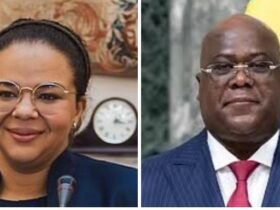‘Iyo uza kwimenya, nanjye ukamenya, ntiwari kunyica’ (If you knew who you are, and knew who I am, you wouldn’t have killed me)’– Message at the Gisozi Genocide Memorial.
This video (poorly subtitled in French): http://bit.ly/2GCUxuS shows General James Kabarebe, former Minister of Defence and Presidential Advisor on Security, giving a lecture to members of the Genocide Survivors Students Association (AERG) in November last year. Afande Kabarebe was speaking to AERG youth about sacrifice. He warns them of the genocide ideology inculcated in their peers raised in the diaspora.
Here is a translation in English, word-for-word: ‘There is another generation of Rwandans who grew up like you did, and who are now in a position to organize themselves in Mozambique, in Zambia… They have become economically strong across southern Africa.’
He proceeds: ‘I once read in a newspaper from Lesotho publishing results of the national exams; [the names on] lists of students who scored the highest [were]: Nshimirimana, Twagirimana, Twagirumukiza, etc., the top 20 students had Rwandan names. This reminded me of when we too were in Uganda, we used to be the same. I remember when I was about to go to high school, whenever they published lists of the best performing primary school graduates, the top 100 were Rwandans. Now, two decades later, these countries publish the best students, you find that they are Rwandans.’
‘This wouldn’t be a problem, had these children been brought up with the right ideology. Unfortunately their thinking is like that of their parents, which is to destroy the country. So you are going to be facing each other. They have stabilized and started organizing themselves. They have economic power, in business and in agriculture in Malawi and across southern Africa and even in Europe.’
‘Sometimes our country mobilizes to fight genocide ideology among those groups and some dissociate themselves from it. But, this means that there is another generation that will face you with ethnic ideology. Them believing that that’s the line which they should continue, and you believing that never again should such ideology be accepted in Rwanda.’
Then Afande Kabarebe draws a historical parallel: ‘It is going to be difficult to destroy genocide ideology because, thus is Rwandan history. [If you remember] in the immediate aftermath of the genocide, in 1995, 1996, 1997 the defeated government reorganized and attacked the northern province of our country. This is the same as when the Inyenzi [our parents] attacked Rwanda in the early sixties and were defeated…. [So] this leads them to believe that after thirty years, their turn will come back. They are mistaken. What differentiates our ideology to theirs, is that we haven’t spent thirty years preaching hatred; we have spent it rehabilitating the people: the Rwandan social fabric.’
This requires consciousness, not only for survivors but for all youth. What we freedom fighters and survivors have in common is our vulnerability and what the country demands from us. To always put the country first before one’s own life. It is to bring all the people together: You must be magnanimous. You have more to give, you must give forgiveness, you must go the extra mile compared to the rest of Rwandans.
If you are lucky, your peers [referring to youth in the diaspora] would join you in this journey so that the country advances in unity. But you survivors, have more to give because you have been affected more, compared to your peers who have not seen what you saw.
The message was poetic, a message of selflessness and abnegation; a message of patriotism. Obviously, it did not sit well with genocide revisionists, including one Gaspard Musabyimana, a former intelligence officer in President Habyarimana’s office. Gaspard wrote an entire blog in French distorting the lecture. He claimed to have uncovered a video that had been hidden because in it Afande Kabarebe ‘preaches hate’ and ‘makes revelation on the plans of the RPF to disorient refugees in exile’. He said Afande Kabarebe refers to ‘Hutu’ children as ‘dangerous’ and tells ‘Tutsi’ children that ‘they have the country now and must impose their ‘monopoly’ over it.
As you have seen in the transcripts above, none of that is true. He spoke nothing on the magnanimity and forgiveness that Afande Kabarebe was preaching. He spoke nothing of the sacrifice the general asked of the young Rwandans, then concludes with a pronouncement that reconciliation in Rwanda is a pipe dream.
Musabyimana’s blog was republished by the usual genocide deniers and revisionists, such as Judy Rever, Filip Reyntjens, as well as those who oppose the government in Rwanda.
However, the hate blogger and the neocolonial professor make one big mistake: AERG is not a Tutsi organization!
You see, 25 years later, there are not many genocide survivors who are still in school.
Now, I had promised myself to not react to genocide ideologues in 2020. But I feared that if this incident goes unchallenged, the majority of Rwandan youth in the diaspora who do not speak Kinyarwanda might take the distortion at face-value.
Every year, more and more Rwandan youth in the diaspora defy their parents and visit Rwanda, some even visit without their parent’s knowledge. And that’s all it takes: one visit, to realize that all those dystopian stories they have been brought up with, were self-serving lies. To genocide revisionists that is a loss. So they do all in their powers to ensure that children of Hutu parents never set foot in Rwanda.
Isn’t it amazing that after stopping the genocide, the victors (RPF) would extend an open invitation to the killers, while offering a brighter future to their innocent children, and that it would be killers who would attempt to prevent the reunification?
Isn’t it uncanny that children of perpetrators would be forced by their own parents to wear their parents’ guilt and be trapped in a state of denial of what their parents did, while the victims are willing to forgive, reconcile and move on?
Isn’t it sad, that western universities – especially in Belgium – continue to fund, host and promote double-genocide theories, revisionism and denial of a genocide that has been recognized globally? In short, isn’t it tragic that killers and their supporters are sponsored to write their memoirs?
That some westerners see Paul Kagame, James Kabarebe and the RPF as enemies, for one reason or another is quite alright; that they use their bias to side with killers to infuse more hate into young minds in exile is horrifying. In fact, this state of affairs comes to buttress Afande Kabarebe’s message that we face a relentless, supported enemy.
All Rwandan children are born innocent, free and equal. However selfish parents deny them the right freedom by wrapping them into their own guilt. What kind of parent would wish to take down their children with themselves into the abyss of hate, instead of setting them free to restore the family name?
Those who killed Tutsi wanted to kill the Rwandan nation. They haven’t given up on that mission. Scholars believe that genocide ideology will come back to Rwanda, because as long as genocide perpetrators continue to roam the world freely, as long as deniers and BBC Gahuzamiryango are still there, as long as the University of Antwerp will continue to be a laboratory of divide and rule, Genocide ideology will be there.
On this ‘Heroes’ day’, we must meditate on the words of Afande Kabarebe and commit to standing ready and ideologically clear in order to help our age mates in the diaspora to denounce hate and join us in building our common nation.















Leave a Reply